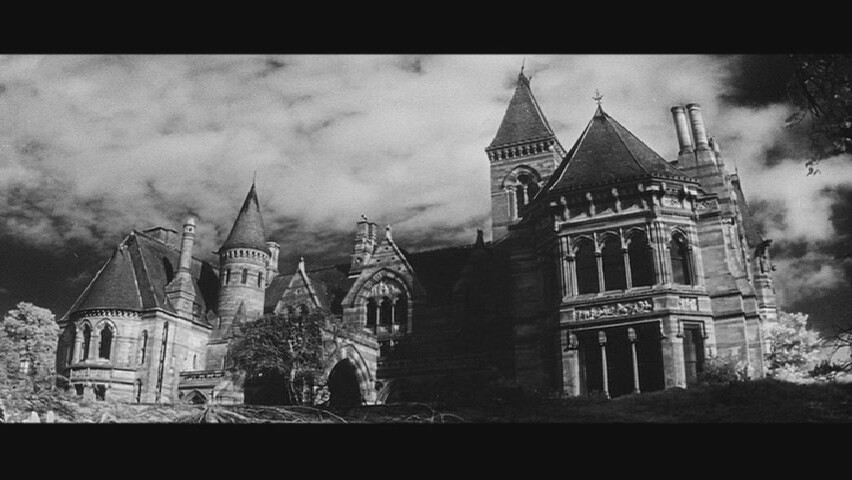The Haunting
Directed by Robert Wise
1963
"Silence lay steadily against the wood and stone of Hill House, and whatever walked there... walked alone."
I like to think I don't scare easily. The language of horror films is just something you can learn and, with time, easily predict. You know the heroine will investigate the strange noise, find it's a cat or a branch, and breathe a sigh of relief. And you roll your eyes, bored, knowing the killer's stood behind her. We've seen it all a thousand times. The only film that really, truly frightens me – and I mean that when The End appears on screen and the video stops, I'm still frightened – is fifty years old and doesn't include any murderers, monsters or blood. The Haunting is a masterpiece of psychological terror, and I've yet to see its equal.
Four psychic researchers go to Hill House, hoping to investigate claims that it's haunted. And oh boy, is it haunted. They (and we) are subjected to torrents of strange noises and hallucinations, as an unseen thing separates and torments them. Robert Wise's expertly-filmed chiller succeeds because it taps into that basic nightmare fear of what's making that noise, what's on the other side of the door. In dreams, we're paralysed by the idea that we might find out. The Haunting holds us at that level of agonised panic for almost its entire runtime, and never shows us anything. Your imagination does a lot of the work, and guess what: it doesn't stop just because the film's over. Go to bed shortly after watching The Haunting and you'll notice more than ever how many strange, unexplained noises your home makes at night. I did not sleep easily last night, and I've seen this film easily ten times.
Scaring the audience is not something that comes easily, and an enormous amount of skill has gone into it. Firstly, there's Hill House itself. Huge, gothic, all at angles, something as simple as a mirror tilted forwards is enough to cause unease. Wise films the house like a character, treats its spires and archways like eyes, watching the characters as they go about their business. Watching us, too. Even the way actors are framed increases the sensation that there's something else there. At one point, an empty chair sits slightly out of focus in the background. We listen to the main character, we're meant to look at her, but I couldn't stop looking at that chair. My imagination, thanks to the direction and sound, was all too happy to put a ghostly something in that chair. (It's a trick used to great effect thirty-five years later, in Shyamalan's The Sixth Sense.)
Next, there's the sound. Obviously there's the famous scene where something pounds on the walls, but I'd argue the entire soundtrack is just as frightening. Whether it's a creature sniffing around the corners of a door, a dead woman's laugh echoing around the corridors, or just an eerie gust, a constant atmosphere of What-The-Hell-Was-That? hangs over the film. The music, by contrast, is an all-out assault on the nerves: dramatic, loud, it occasionally tips the story from sinister unease to absolute horror.
Finally, we have the cast. Eleanor (Julie Harris) is a few apples short of a bunch even before her visit to Hill House, thanks to years looking after her invalid (now dead) mother. Desperate for attention, Nell may or may not be in the house's thrall, exacerbating things by at one point (maybe) writing a ghostly message to herself in chalk. (Fellow investigator Theo suspects her all along, saying pointedly "You know none of us did it".) Nell is also a narrator of sorts, which isn't so much a storytelling device as another method for scaring the audience; her eerie inner voice is, in effect, haunting her, and edging her closer to madness. We know from the history of Hill House that Nell will fit right in there.
Also present are Doctor Markway (Richard Johnson), whose experiment this is; Theo (Claire Bloom), a clairvoyant whose fluctuating affections for Nell are not helping her mental state; and Luke (Russ Tamblyn), a youngster who stands to inherit Hill House. The house affects all of them, eroding Markway's enthusiasm, Theo's cool exterior and Luke's carefree attitude until the only one who isn't petrified, oddly enough, is Nell. The transformation of Luke in particular – a smirking cynic – is cleverly done to convince any still unfazed stragglers in the audience of how frightening all of this is.
There are a few big jump-out-of-your-seat scares, but it's the building dread and chilly sense of panic that makes The Haunting a classic. The story, particularly Markway's opening narration of the horrible history of Hill House, is strange and gripping. The way the film leaves you afraid of empty rooms and probably unable to sleep, is unforgettable. The fact that Robert Wise did all this with sound effects and furniture puts most modern horror movies to shame. It's easily one of my favourite films ever, as frightening as Rear Window is tense and exciting.
The Haunting may not work on everybody, as inevitably some people will look at all the empty rooms and just see empty rooms. But it seems precisely calculated to give me sleepless nights and, as not a lot of films can do that, I'm eternally grateful. Just not very well rested.



Yup, I just saw empty rooms. Not that my imagination can't terrify me in real life, but it's kind of on a back burner when I watch a film. I expect the film to do the work, not me.
ReplyDeleteNell's mental narration was so irritating that I hadn't time to be uneasy, I just wanted her to SHUT UUUUUUUUUUUP.
Still, it's a lot better than the Godawful remake. Spit spit.
ReplyDelete